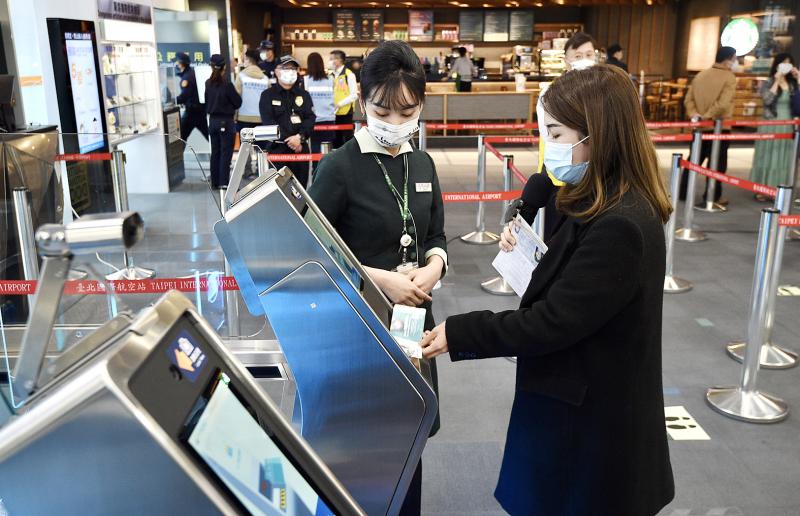Starting today, people can enjoy faster service at Taipei International Airport (Songshan airport) with its smart e-pass system, allowing them to have their passport authenticated, pass through immigration and board their flight electronically, the Civil Aeronautics Administration (CAA) said yesterday.
Songshan airport is the first in the nation to conduct a six-month trial of the “3e Smart Service” — e-Check (passport authentication), e-Gate (immigration) and e-Board (gate access) — as part of the government’s efforts to promote “touchless service.”
Minister of Transportation and Communications Lin Chia-lung (林佳龍) inspected the airport’s 3e Smart Service yesterday morning.

Photo: Peter Lo, Taipei Times
E-Gate was built by the National Immigration Agency, while the airport installed smart devices before the entrance to the security check area and at the boarding gates to enable passengers to independently complete the steps on their own, Taipei International Airport service director Hsu Nei-shin (徐乃新) told reporters.
Temperature readers have been placed outside the e-Check area, and travelers are not allowed through if their temperature exceeds 37.5°C, he said.
Before entering the security check area, travelers’ passports and boarding passes are scanned and authenticated by two e-Check devices, he said, adding that the devices are equipped with facial recognition technology.
The devices control automatic doors that do not open if a traveler has an expired passport or there are other irregularities, he said, adding that members of airline ground crews are there to assist people.
The service is offered in Chinese, English, Japanese and Korean, Hsu said.
People’s travel information is automatically forwarded from the e-Check and e-Gate devices to the e-Board devices, he said.
To board, travelers stand before a camera on the e-Board devices and have their boarding pass scanned again, he said.
The facial recognition data from each traveler are deleted from all devices one hour after their departure, he added.
CAA said that it spent NT$990,000 building the 3e Smart Service.
Using the smart system for authentication and boarding would lighten the workload of personnel, improve system accuracy and strengthens aviation security, it added.
In related news, Lin said that “travel bubble” tours are more likely to succeed if they are short-haul flights, or flights shorter than five hours.
As tours to Palau are to begin on Thursday next week, Lin was asked whether the nation could make similar agreements with other countries.
Singapore and Thailand are pursuing similar deals with Taiwan, Lin said.
Starting on Thursday next week, travelers entering Thailand would be quarantined for 10 days, not the current 14 days.
Asked whether the government was in talks with Thai officials, Lin said that Bangkok is aggressive in promoting tourism, because it is its main source of income.
Whether other “travel bubbles” work out depends on the COVID-19 pandemic situations in other countries and on negotiations by the Ministry of Foreign Affairs, Lin said.

‘ABUSE OF POWER’: Lee Chun-yi allegedly used a Control Yuan vehicle to transport his dog to a pet grooming salon and take his wife to restaurants, media reports said Control Yuan Secretary-General Lee Chun-yi (李俊俋) resigned on Sunday night, admitting that he had misused a government vehicle, as reported by the media. Control Yuan Vice President Lee Hung-chun (李鴻鈞) yesterday apologized to the public over the issue. The watchdog body would follow up on similar accusations made by the Chinese Nationalist Party (KMT) and would investigate the alleged misuse of government vehicles by three other Control Yuan members: Su Li-chiung (蘇麗瓊), Lin Yu-jung (林郁容) and Wang Jung-chang (王榮璋), Lee Hung-chun said. Lee Chun-yi in a statement apologized for using a Control Yuan vehicle to transport his dog to a

Taiwan yesterday denied Chinese allegations that its military was behind a cyberattack on a technology company in Guangzhou, after city authorities issued warrants for 20 suspects. The Guangzhou Municipal Public Security Bureau earlier yesterday issued warrants for 20 people it identified as members of the Information, Communications and Electronic Force Command (ICEFCOM). The bureau alleged they were behind a May 20 cyberattack targeting the backend system of a self-service facility at the company. “ICEFCOM, under Taiwan’s ruling Democratic Progressive Party, directed the illegal attack,” the warrant says. The bureau placed a bounty of 10,000 yuan (US$1,392) on each of the 20 people named in

INDO-PACIFIC REGION: Royal Navy ships exercise the right of freedom of navigation, including in the Taiwan Strait and South China Sea, the UK’s Tony Radakin told a summit Freedom of navigation in the Indo-Pacific region is as important as it is in the English Channel, British Chief of the Defence Staff Admiral Tony Radakin said at a summit in Singapore on Saturday. The remark came as the British Royal Navy’s flagship aircraft carrier, the HMS Prince of Wales, is on an eight-month deployment to the Indo-Pacific region as head of an international carrier strike group. “Upholding the UN Convention on the Law of the Sea, and with it, the principles of the freedom of navigation, in this part of the world matters to us just as it matters in the

The High Court yesterday found a New Taipei City woman guilty of charges related to helping Beijing secure surrender agreements from military service members. Lee Huei-hsin (李慧馨) was sentenced to six years and eight months in prison for breaching the National Security Act (國家安全法), making illegal compacts with government employees and bribery, the court said. The verdict is final. Lee, the manager of a temple in the city’s Lujhou District (蘆洲), was accused of arranging for eight service members to make surrender pledges to the Chinese People’s Liberation Army in exchange for money, the court said. The pledges, which required them to provide identification